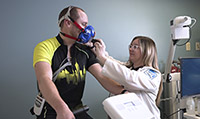
Navigating Telehealth for Rheumatology – Q&A with Rheumatologist, Alfred Becker, MD
The way the physicians at Crystal Run Healthcare provide care to patients is evolving. In response to the COVID-19 pandemic, our interactions have changed from mostly in-office visits to a combination of telehealth and in-person appointments. Rheumatologist, Dr. Alfred Becker discusses how seeing his Rheumatology patients has changed due to the coronavirus outbreak and some ways it’s stayed the same.
As a provider, how has the way you’re providing care changed?
Dr. Becker: The way we’re providing care has changed in some fundamental ways, but in other ways it’s stayed the same. As a Rheumatologist, when I have a virtual Telehealth appointment, we can’t physically assess the patient’s areas of concern through touch, but the video technology allows me to connect to my patients. We can see each other, smile at each other, and have a unity of contact which hasn’t changed. A personal connection is the only way to provide care and Telehealth visits allow us to maintain that connection.
Telehealth visits have also allowed people who have been quarantined or have self-quarantined, to have much needed appointments with their physicians even if they’re physically isolated. Technology has opened up an avenue for people who would not have been seen because of COVID-19. This will open up an avenue to borderless medical care; if patients have disabilities they can connect from home – Telehealth visits are here to stay.
What is the biggest challenge you’re facing as a provider during this time?
Dr. Becker: As a Rheumatologist, the ability to examine a patient through touch – feeling joints and stress in the muscle, determining range of motion, comparing consistency – doesn’t currently exist yet with the new technology.
For Rheumatology patients, how are you able to provide care for them via Telehealth?
Dr. Becker: For rheumatology patients, Telehealth is working better than I anticipated. A lot of our patients with joint problems can communicate their areas of pain verbally or even effectively through facial expressions. Seeing them or verbally hearing them allows rheumatologists to determine if their currently prescribed medications need to be changed based on current needs. The effects of face to face communication, even a virtual one, help immensely with a rheumatology diagnosis.
A lot of rheumatology patients have transportation issues, if they have bad arthritis they can’t drive and rely on family members. Patients feel more comfortable now that they don’t have to ask people to drive them to their appointment.
What do rheumatology patients need to do to prepare for a telehealth appointment?
Dr. Becker: Patients don’t really need to prepare for telehealth appointments for rheumatology. Time is not a tremendous pressure, offering a much more flexible method of delivery. With the evolution of video communications, you really don’t have to prepare in advance because you can maneuver the questions as they come up.
What advice do you want to offer patients right now about healthcare?
Dr. Becker: While there are downsides to telemedicine, I want patients to know that there is a technology out there that can change the way medicine is being practiced. If it’s too difficult, it’s not absolutely necessary to be in the room with a doctor. Patients can connect with a physician in a way that works, where all your privacy is connected. Crystal Run Healthcare has a system in place that’s HIPPA compliant, where information is encrypted so privacy is controlled. People with rheumatological and other health issues can feel comfortable communicating freely and without concern about privacy. Additionally, people who live far away from Crystal Run Healthcare and may not have access to transportation can have access to the care they need. In this current era of Telemedicine, distance is almost a non-issue in the treatment for people with rheumatic conditions!
What changes do you think are here to stay?
Dr. Becker: Overall, I think the mindset that individuals no longer have to be circumscribed by distance from their physician is here to stay. In the long haul, I see patients being able to see their physicians even if they move to another state; they won’t have to leave the physicians they’ve created relationships with over the years.
Telehealth will remain an integral part for rheumatic illness. Because many of our rheumatology patient’s issues can be solved with telemedicine, we open up an avenue that will change the way healthcare is delivered in a dramatic way. Some things like surgeries and shots won’t be able to be done virtually, but it’s creating a borderless-ness of delivery of care!
Alfred Becker, MD, is a Board-Certified Rheumatologist at Crystal Run Healthcare in Suffern. He earned his Medical Degree and completed Fellowship-training in Internal Medicine at Albert Einstein College of Medicine in Bronx, NY.
 Cardiopulmonary Exercise Testing (CPET)
Cardiopulmonary Exercise Testing (CPET) Request medical records online
Request medical records online